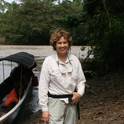Analysis of spinning and of silk domiciles revealed similarities and differences for three species of embiids: Antipaluria urichi (Saussure), Pararhagadochir trinitatis (Saussure), and Oligotoma saundersii (Westwood). Each exhibited similar routines while spinning; they positioned the silk by touching the substrate with either front tarsus and by moving the leg to the next position, with many silk strands issuing forth at each step. Reinforced pathways developed as they spun while traveling from diurnal retreats and nocturnal foraging zones. Frass from the interior of their domiciles was spun into the silk. O. saundersii was unique in that it plastered its silk with gathered materials. Analysis of field colonies of P. trinitatis and O. saundersii showed that, like A. urichi, adult females share their silk with offspring and, often, with other females.
Article
Silk spinning behavior and domicile
construction in webspinners
Biology
Document Type
Article
Publication Date
3-1-2002
Publisher
Springer
Abstract
Citation Information
Edgerly, J.S., J.A. Davilla, and N. Schoenfeld. 2002. Silk spinning behavior and domicile
construction in webspinners. Journal of Insect Behavior. 15: 219 – 242.
